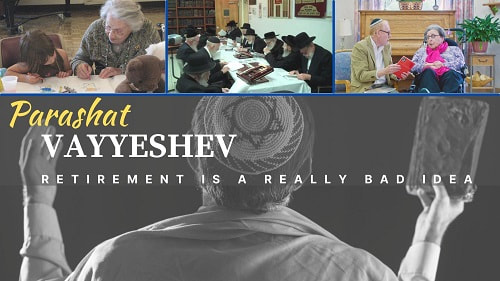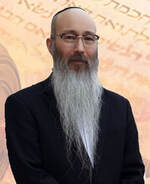|
By: HaRav Menashe Sasson Reporting from Jerusalem, Israel Published in the U.S.A. Parashat Vayysehev begins “וישב יעקב,” which literally translated means “and Ya’aqob sat down” in Eretz Yisra’el. Bereshit 37:1. The Midrash interprets this pasuk as saying that Ya’aqob sought to dwell in tranquility in Eretz Yisra’el. Ya’aqob had endured a hard life. From birth, he and his brother Esav were at odds with each other; Ya’aqob was taken advantage of during his years at Laban’s house; his daughter was raped; his sons killed the rapist and all the other men in the city where the rapist had resided, and then destroyed the entire city. As a result, Ya’aqob lived in constant fear of retaliation. Nevertheless, the Midrash rebukes Ya’aqob for seeking a life of tranquility:
Bereshit Rabbah 84:3. There are quite a few Jews who live in America and other countries of the galut [גלות] (exile) who have “retired,” that is, who have stopped working for a paycheck or other income and who have begun to rely on funds disbursed from a retirement account to pay their living expenses. A small percentage of those “retirees” have made Aliyah. Unfortunately, however, most do not. As the old Chinese proverb goes, we live in “interesting times.” Whether these “interesting times” are a blessing or a curse will depend in large part on our individual choices concerning how we live our lives. For a Jew, there can be no greater blessing than to live in the Land to which HaShem referred when he told Abram (whose name HaShem later changed to “Abraham”) to “Get out of thy country, and from thy kindred, and from thy father’s house, [and go to] the land that I will show thee, and I will make thee a great nation.” Bereshit 12:1. There are many obstacles to making Aliyah. Moving to Eretz Yisra’el is neither easy nor inexpensive. Living in Eretz Yisra’el is not the same as living in galut [גלות]. Retired Jews, like most Jews who live in galut [גלות], are not fluent in Hebrew, the language of the Jewish people and the official language of Medinat Yisra’el (the state of Israel). The cost of living in Eretz Yisra’el is higher than in many other countries, although there are major metropolitan areas in galut [גלות] where the cost of living is higher than in Eretz Yisra’el. Taxes are high in Eretz Yisra’el; however, taxes are high – and rising – in other countries, as well. Health care in Medinat Yisra’el is also a concern for those who make Aliyah, and often more so for retirees, whose health care needs are often greater than that of younger individuals. The good news is that health care in Medinat Yisra’el is much more affordable than in many western countries. The bad news is that, because Medinat Yisra’el has a socialized (government-controlled) health care system, the level of health care service is not what one might expect in a free-market system. The bottom line, however, is that Olim (persons who make Aliyah) can obtain in Eretz Yisra’el the health care services they need. After retirees make Aliyah and get settled in their new homes and communities, there is ample time and opportunity to become conversant in Hebrew; learn Torah on a level that cannot be experienced in galut [גלות]; travel within Eretz Yisra’el and personally experience locations that, heretofore, one has only been able to read about; become involved in helping other Jews; and, of course, to make new friends. Although galut [גלות] may seem “comfortable” or “tranquil,” we learn from our Parasha that our purpose in this world [עולם הזה] is to work, to be productive, to not live in tranquility. Being “productive” does not necessarily mean working for a salary or running a business, but it does mean doing something that benefits others. A Jew who makes Aliyah benefits other Jews, both individually and as a nation, simply by being physically present in Eretz Yisra’el. From that starting point, the possibilities for a “retired” Jew who lives in Eretz Yisrael to be of benefit to other Jews increases exponentially. As we learn from our Parasha, “retirement” as that term is commonly understood, a life of tranquility, is not what HaShem intends; rather, it is a really bad idea. As religious Jews, we want to do HaShem’s will. So, if you are approaching retirement, or have already retired, you might want to consider whether HaShem would prefer that you live a tranquil retired life in galut [גלות] or whether HaShem would prefer that, as He instructed Abraham Abinu, you “Get out of thy country, and from thy kindred, and from thy father’s house, [and make Aliyah to Eretz Yisrael]. May all Jews, “retired” or not, merit to make Aliyah and live in the Land which HaShem promised to Abraham Abinu. שבת שלום Shabbat Shalom! Copyright © The Israel Foundation. All Rights Reserved.
0 Comments
Your comment will be posted after it is approved.
Leave a Reply. |
THE ISRAEL FOUNDATION





